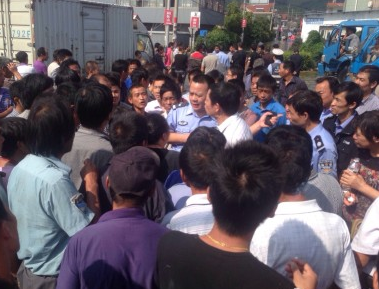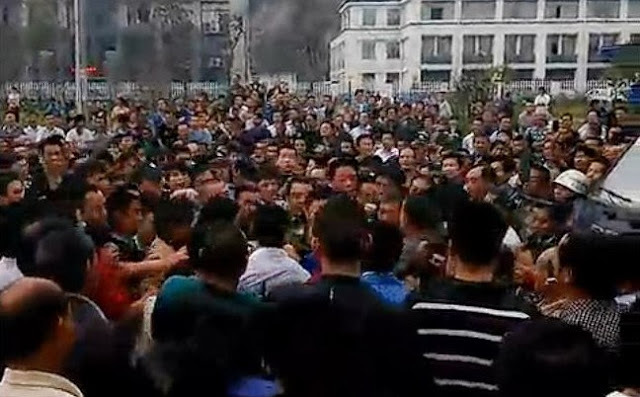A new study shows that China's Communist Party is winning an “ideological battle” against public opinion leaders on social media and other commentary platforms in China.
At the recent China Internet Media Forum, People’s Daily Public Opinion Monitoring Unit director Zhu Huaxin (祝華新)presented data illustrating the initial impact of an online offensive launched by the Chinese Communist Party in August of this year. The results show a marked drop in political commentary and conversation on social networks and other platforms over the past two months.
The offensive began on August 10, when the State Internet Information Office convened a group of major online opinion leaders and Internet celebrities and compelled them to adopt and promote a set of seven “self-censorship guidelines.”
Later that month, at a meeting of Party propaganda chiefs, Chinese President Xi Jinping told Party leaders that ideological control needed to become the Party's number one priority. Xi ordered the CCP propaganda machine to build “a strong Internet army” of government censors who would focus on eliminating online “rumors”. For many, this signaled a new, even tougher era for Internet users in China, where any piece of information that does not come from official government channels can be considered a rumor.
The report shows that the CCP has successfully maintained a dominant position in the online public sphere since the battle began. Zhu explained in his presentation that over the past two months, on leading social media platforms, the total number of messages posted by state-controlled media outlets and government branches have well out numbered messages posted by “public opinion leaders” or those who use online platforms simply to share their own personal views.
Government and Party suddenly dominate online spaces
The study drew from four months’ worth of observations of a set group of public opinion leaders’ micro-blogging accounts on Sina Weibo. Two months before August 10, these account holder had posted a total of 72,481 messages on Sina Weibo. In the two months following the launch of the censorship campaign, the accumulated number of messages fell to 65,126, yielding a 10.2% drop. Between September 11 to October 10, the number fell by 24.9%.
The chart below presents data from Zhu's report, showing the total number of messages in three major sectors according to a his research samples.

Sina Weibo messages posted by public opinion leaders, state controlled media outlets and government branches from August to October 2013.
Zhu considered the result a victory of the Party's ideological battle and suggested that the Party further the effort by encouraging academics and writers to shape Chinese internet culture and inviting people with professional backgrounds to comment on issues that relate to their expertise. He also emphasized the need to maintain continuous efforts to crack down on Internet Water Armies (paid online commenters working for private companies) and to let state-run media take the lead in channelling public opinion.
Critical comments have vanished
Zhu's findings on Sina Weibo posting trends are troubling, but they are purely quantitative. From my own observations, I would argue that the total number of original posts made by prominent commenters and Internet celebrities has seen a far more tremendous drop.
Apart from social media, online forums and communities also have been affected by the party's ideological battle. Zhu Huaxin took “the society and people” section of a popular portal, Tianya Forum, as an example. In September, the total number of posts had fallen by 60% — the site saw 34% fewer “positive and constructive” posts and 63% fewer “negative and critical” posts. The number of posts related to individual rights and corruption had fallen by 70%.
Between January to August 2013, an average of two corruption cases were exposed online each month. But in September 2013, not a single citizen-initiated anti-corruption case was exposed online.
There also appears to be a drop in reporting on natural disasters, an issue that has been sensitive for the Chinese government in the past. While rainstorms and flooding in Beijing last July generated a flurry of online reports and commentary, some of which criticized government relief efforts, floods in Yuyao in October generated far fewer reports. While 60% of citizen posts on the Beijing rainstorms contained some amount of subjective commentary, only 15% of posts on Yuyao floods included subjective remarks. But “objective description” increased from 10% in July to 56% in September. The proportion of re-posts from state news agency reports, however, remained the same.

The Weibo user who posted this photo wrote only the location of the photo scene without telling readers what exactly happened there. This leaves web censors unable to identify and delete photos.
It is clear that netizens are not expressing their opinions on the Yuyao Flooding even though the incident is highly controversial–thousands of local residents protested in front of the government offices and some even attacked local police out of frustration with the government's flood relief efforts. The lack of online conversation about this is worrying. Citizen reporting on disasters can be critical to helping improve relief efforts and in emergencies, to get aid to those in need quickly.
Instead of reporting on people's grievances, state media outlets praised government relief efforts in Yuyao. In the past, netizens would have openly criticized the official media and government officials for this kind of behavior. But perhaps due to the party's new ideological offensive, many netizens just uploaded photos with objective descriptions and avoided making any subjective comment or judgement.
On top of this, most of the photos showing the confrontations between local residents and police officers have vanished from Sina Weibo. The very few surviving photos of Yuyao protests have either been posted by users whose accounts have not been verified (who do not fall into the category of “opinion leaders”) and have very few followers, or by users who have not used terms like “protest” or “confrontation” to describe their photos.
Meanwhile, overseas news outlets have collected the online photos and published them on their own platforms. NTDTV has a full collection of online photos and they explained the background of the confrontation. But this has little direct impact in China, where most overseas Chinese news websites are blocked.

NTDTV collected this photo from online sources. It pointed out that the confrontation took place because the local police had removed the sand-bags that blocked water from submerging local villages in Yuyao. This photo is taken at the same spot of the above photo.
The CCP may have won a battle in blocking critical opinions from spreading online. However, when people cannot find a way to release their anger towards injustice, they will find another outlet. The recent bombing incidents in Beijing and Shanxi may indicate the emerging of another battlefield, one in which everyone will lose.




10 comments